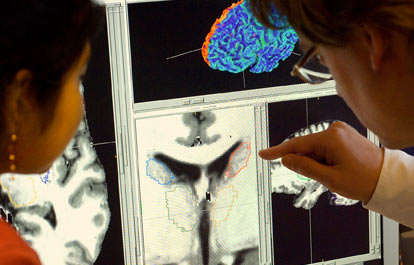

Scientific Lectures //
Title: Intrinsic Functional Connectivity of Future Orientation in ADHD: The Immediacy of Now
F. Xavier Castellanos Ph.D. - Director, Center for Neurodevelopmental Disorders NYU Langone Medical Center Child Study Center; Nathan Kline Institute for Psychiatric Research
Presented: March 21, 2013
ABSTRACT: Imaging intrinsic functional connectivity through task-free (“resting-state”) functional magnetic resonance imaging has emerged as a mainstream modality for examining brain-behavior relationships. Attention-Deficit/Hyperactivity Disorder (ADHD) has long been a focus of imaging efforts; recently investigators are extending neural models of ADHD beyond prefrontal cortex, striatum and cerebellum to include functionally defined networks including Dorsal and Ventral Attention Networks, and particularly the Default Network. I will present preliminary data examining differential intrinsic functional connectivity in ADHD between subsystems of the Default Network associated with cognitive processing regarding the self in the present versus the future following the approach first described by Andrews-Hanna et al. (2010).
BIOGRAPHY: Xavier (pronounced “Hobby-air”) Castellanos studied linguistics at Vassar College, experimental psychology at the University of New Orleans, and medicine at Louisiana State University in Shreveport. He trained in pediatrics, psychiatry and child and adolescent psychiatry at the University of Kentucky, and in child psychiatry research at NIMH. He is the Brooke and Daniel Neidich [pronounced “NYDICK”] Professor of Child & Adolescent Psychiatry, and Professor of Radiology, Physiology & Neuroscience at the NYU School of Medicine. He directs the Center for Neurodevelopmental Disorders at the NYU Child Study Center and Child and Adolescent Research at the Nathan Kline Institute for Psychiatric Research. He serves on the NIH Council of Councils, and was a member of the American Psychiatric Association DSM-5 Task Force as Vice-Chair of the Workgroup on ADHD and Disruptive Behavior Disorders. His work focuses on understanding ADHD through neuroimaging-based approaches.

